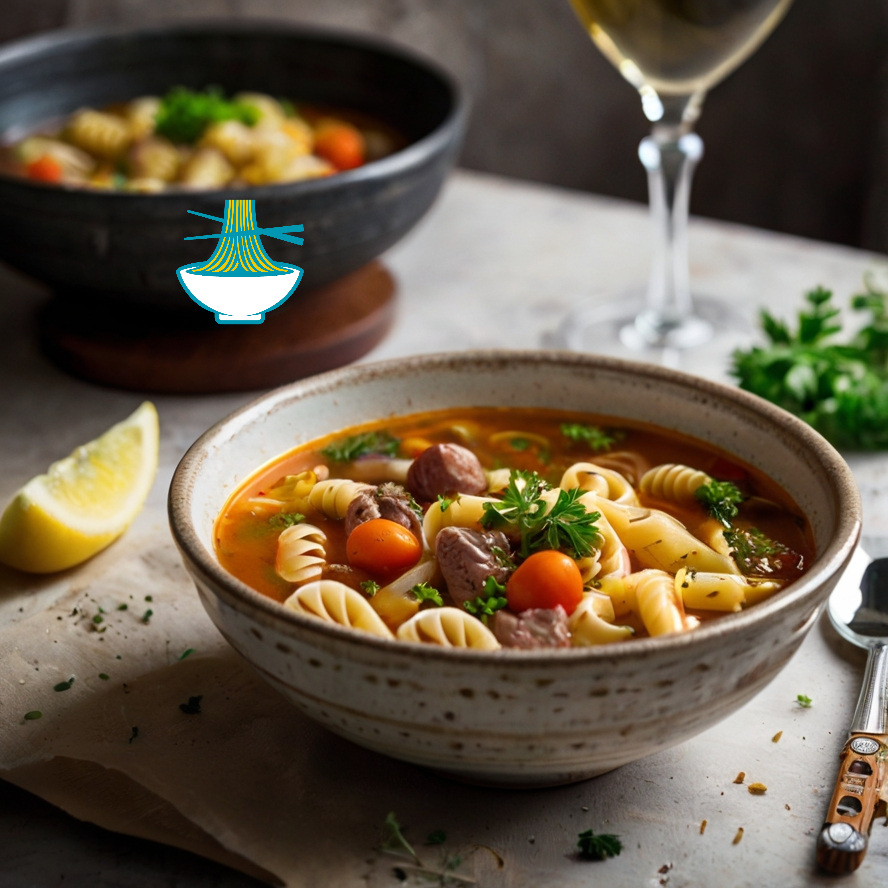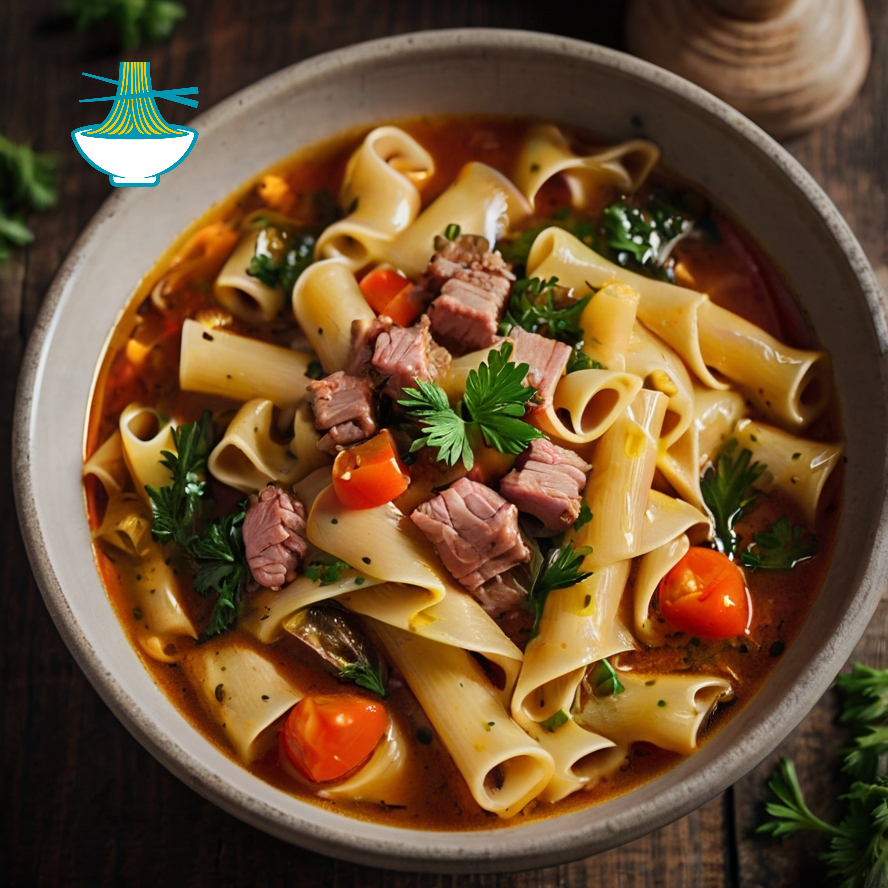Hlalem is a hearty pasta soup featuring small, hand-rolled pasta, vegetables, and meat. Originating from Mediterranean regions, it boasts a rich history of nourishing communities with its comforting flavors and simple yet satisfying ingredients. This traditional dish has evolved over generations, reflecting the culinary heritage of the region while remaining a beloved staple in many households.
Ingredients:
- Hand-rolled pasta (such as ditalini or small shells)
- Assorted vegetables (carrots, celery, onions)
- Meat of choice (chicken, beef, or sausage)
- Chicken or vegetable broth
- Olive oil
- Garlic
- Salt and pepper
- Herbs (such as parsley or thyme)
Method:
1. In a large pot, heat olive oil over medium heat. Add chopped onions, carrots, and celery. Cook until softened, about 5 minutes.
2. Add minced garlic and cook for another minute until fragrant.
3. Add the meat (if using) and cook until browned.
4. Pour in the chicken or vegetable broth and bring to a simmer.
5. Add the hand-rolled pasta and cook according to package instructions until al dente.
6. Season with salt, pepper, and herbs to taste.
7. Serve hot, garnished with fresh herbs if desired. Enjoy your comforting bowl of Hlalem!
Nutrition Value:
1. Hand-rolled pasta (such as ditalini or small shells):
- Calories: Typically ranges from 150-200 calories per serving (1 cup cooked).
- Carbohydrates: Provides energy, with around 30-40 grams per serving.
- Protein: Contributes to muscle repair and growth, with about 5-8 grams per serving.
- Fat: Generally low in fat, around 1-2 grams per serving.
- Sodium: Minimal, typically less than 10 milligrams per serving.
- Cholesterol: Usually cholesterol-free.
- Vitamins and minerals: Contains some B vitamins, particularly folate, and iron.
- Nutritional benefit: Carbohydrates provide energy, while the small amount of protein contributes to satiety. The pasta also contains some essential vitamins and minerals, particularly if made with whole wheat.
2. Assorted vegetables (carrots, celery, onions):
- Calories: Low in calories, typically less than 50 calories per serving (1 cup chopped).
- Carbohydrates: Provides fiber and natural sugars, with around 10 grams per serving.
- Protein: Minimal, around 1-2 grams per serving.
- Fat: Negligible amount, usually less than 1 gram per serving.
- Sodium: Varies depending on preparation, typically low.
- Cholesterol: Cholesterol-free.
- Vitamins and minerals: Rich in vitamins A, C, and K, as well as potassium and folate.
- Nutritional benefit: Vegetables are high in fiber, vitamins, and minerals, promoting overall health and providing essential nutrients for various bodily functions.
3. Meat of choice (chicken, beef, or sausage):
- Calories: Varies depending on type and cut of meat, but generally around 150-250 calories per serving (3 ounces cooked).
- Carbohydrates: Minimal, usually less than 1 gram per serving.
- Protein: High in protein, with around 20-25 grams per serving.
- Fat: Contains varying amounts of fat, with lean cuts having less fat and fatty cuts having more.
- Sodium: Varies depending on preparation, but can be moderate to high.
- Cholesterol: Contains cholesterol, with amounts depending on the type of meat and cut.
- Vitamins and minerals: Rich in B vitamins (particularly B12), iron, zinc, and selenium.
- Nutritional benefit: Meat is an excellent source of high-quality protein, essential for muscle growth and repair, as well as providing important vitamins and minerals for overall health.
4. Chicken or vegetable broth:
- Calories: Low in calories, typically around 10-20 calories per cup.
- Carbohydrates: Minimal, usually less than 1 gram per cup.
- Protein: Can contain some protein, around 1-2 grams per cup.
- Fat: Usually very low in fat, often less than 1 gram per cup.
- Sodium: Can be high in sodium, depending on the brand and preparation.
- Cholesterol: Cholesterol-free.
- Vitamins and minerals: Depending on preparation, may contain some vitamins and minerals, particularly if homemade with vegetables.
- Nutritional benefit: Broth adds flavor to the dish while providing hydration. If homemade with vegetables, it can also contribute some vitamins and minerals.
5. Olive oil:
- Calories: High in calories, with around 120 calories per tablespoon.
- Carbohydrates: Negligible, usually less than 1 gram per tablespoon.
- Protein: Negligible, typically less than 1 gram per tablespoon.
- Fat: High in healthy monounsaturated fats, with around 14 grams per tablespoon.
- Sodium: Naturally sodium-free.
- Cholesterol: Cholesterol-free.
- Vitamins and minerals: Contains vitamin E and K, as well as antioxidants.
- Nutritional benefit: Olive oil is rich in heart-healthy fats and antioxidants, which may help reduce the risk of heart disease and inflammation.
6. Garlic:
- Calories: Low in calories, typically around 5-10 calories per clove.
- Carbohydrates: Contains some carbohydrates, with around 1-2 grams per clove.
- Protein: Minimal, usually less than 1 gram per clove.
- Fat: Negligible, usually less than 1 gram per clove.
- Sodium: Naturally sodium-free.
- Cholesterol: Cholesterol-free.
- Vitamins and minerals: Rich in vitamin C, vitamin B6, manganese, and selenium.
- Nutritional benefit: Garlic is known for its potential health benefits, including boosting the immune system, reducing blood pressure, and improving cholesterol levels.
7. Salt and pepper:
- Calories: Negligible, as they are used in small amounts for seasoning.
- Carbohydrates, protein, fat: Negligible.
- Sodium: Salt is high in sodium, with about 2300 milligrams (the recommended daily limit) in one teaspoon.
- Cholesterol: Cholesterol-free.
- Vitamins and minerals: Pepper contains some vitamins and minerals, including vitamin K and manganese, albeit in small amounts.
- Nutritional benefit: Used in moderation, salt enhances flavor, while pepper adds a hint of spice and may have antioxidant properties.
8. Herbs (such as parsley or thyme):
- Calories: Very low in calories, typically around 1-5 calories per tablespoon.
- Carbohydrates, protein, fat: Negligible.
- Sodium: Naturally sodium-free.
- Cholesterol: Cholesterol-free.
- Vitamins and minerals: Rich in vitamins A, C, and K, as well as minerals like calcium, iron, and manganese.
- Nutritional benefit: Herbs not only add flavor but also provide essential vitamins and minerals, contributing to overall health and well-being.


Comments